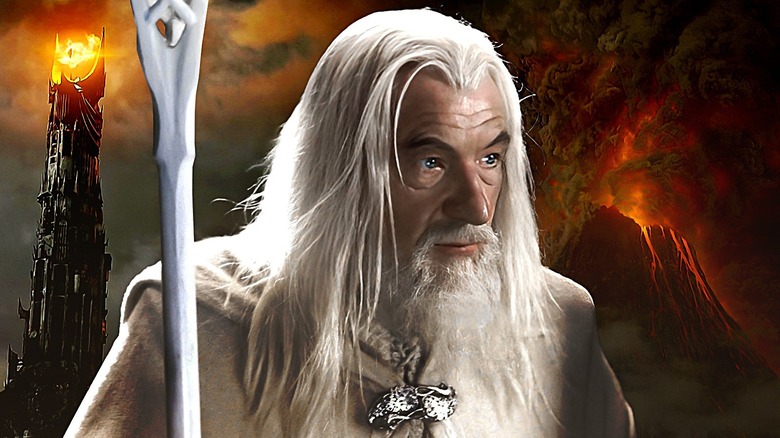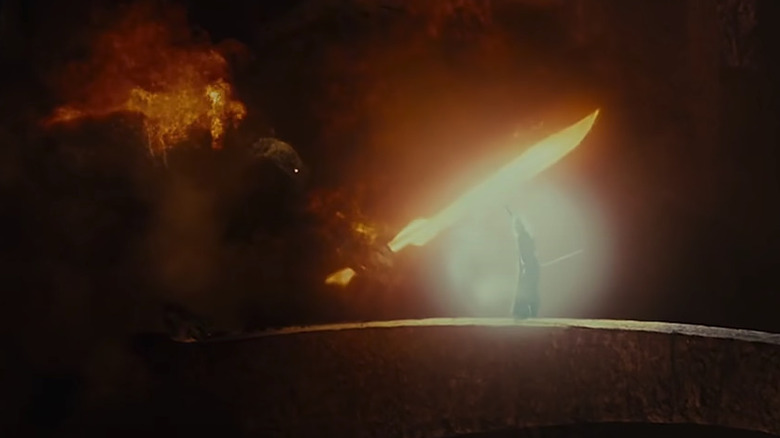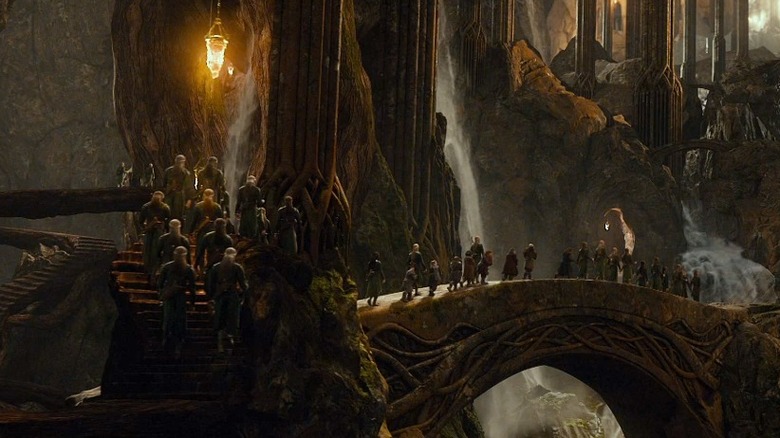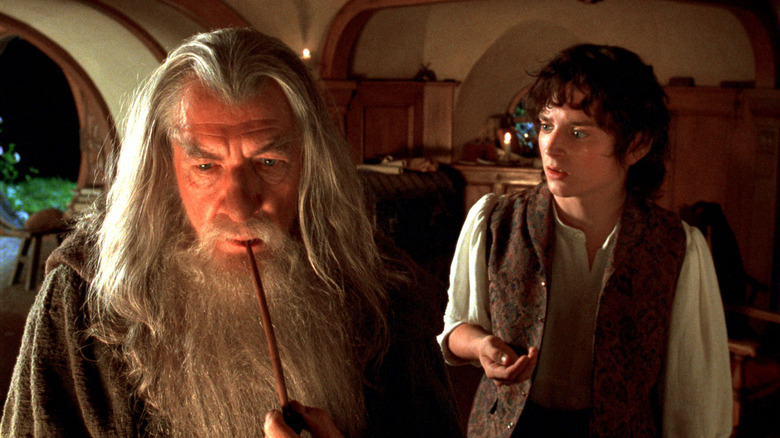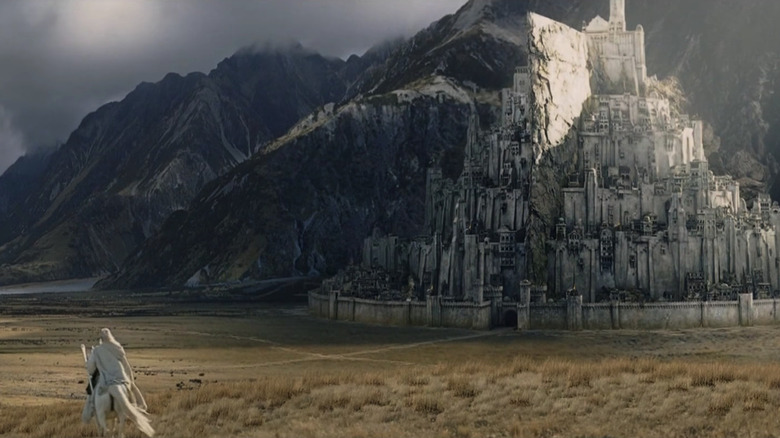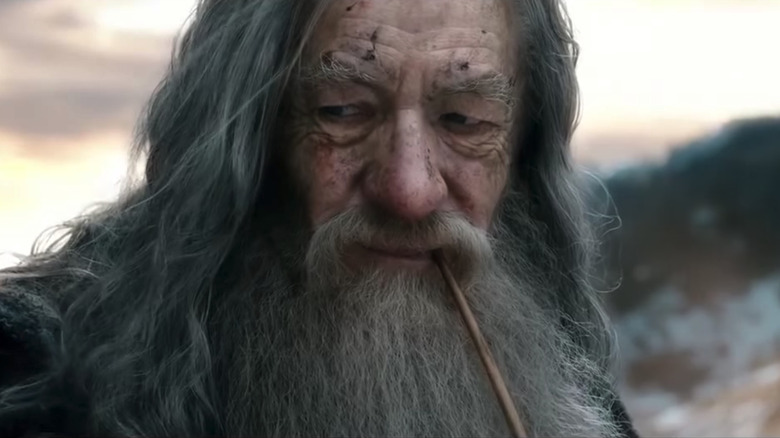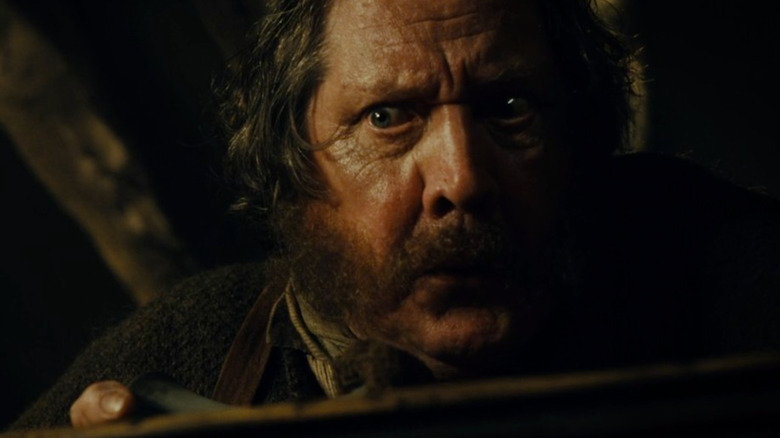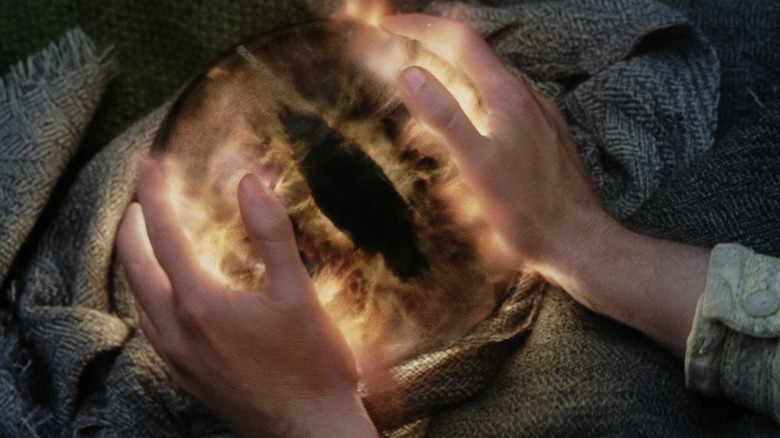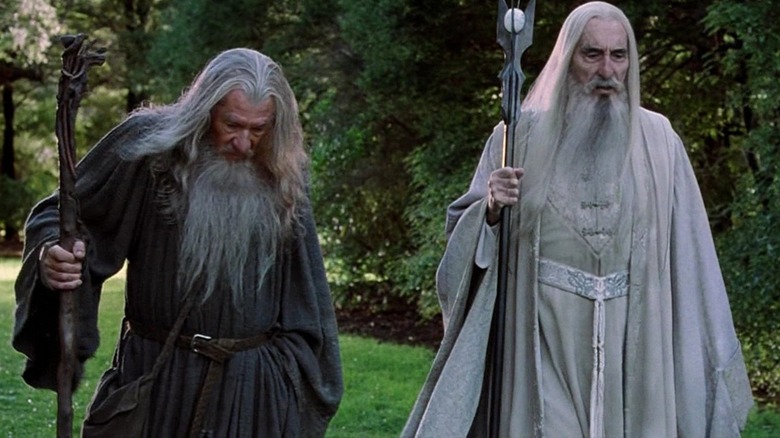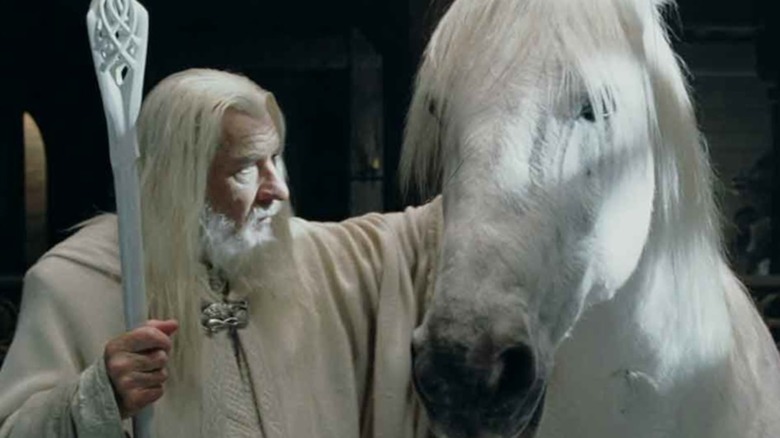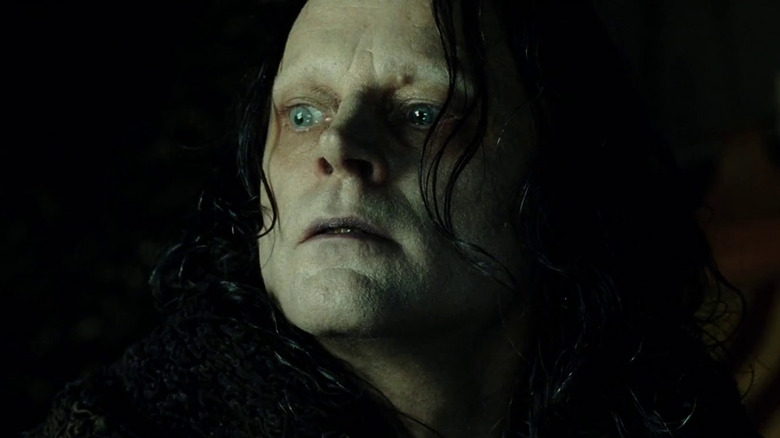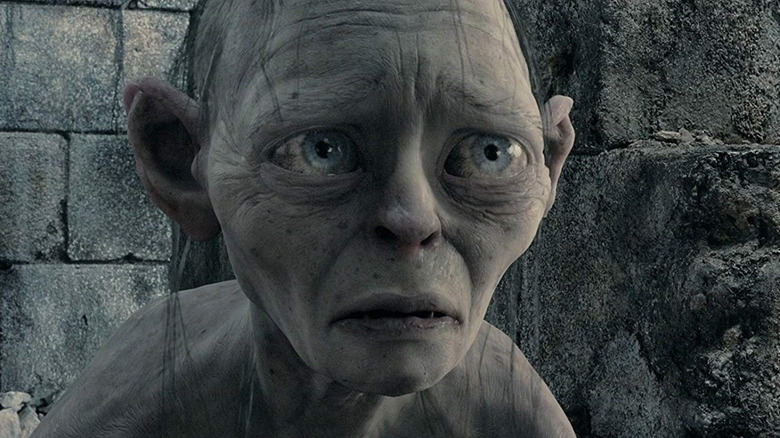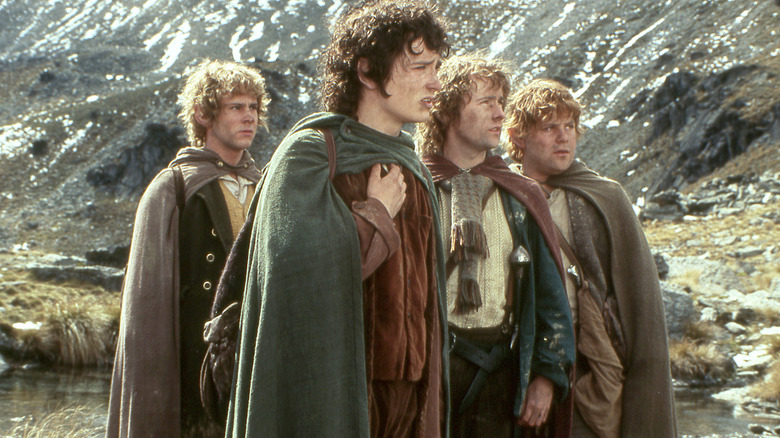The Most Terrible Things Gandalf Has Ever Done
Gandalf is a hero. It doesn't matter if he's orchestrating dragon-slaying adventures as a grey Wizard or restoring exiled kings as a white one. The guy knows how to step up and save the day. From Gandalf's endless string of memorable quotes to the Wizard's iconic appearance, the character consistently displays courage, wisdom, and compassion (along with the occasional laugh).
However, that doesn't mean he's flawless. On the contrary, there are plenty of moments when the Grey Pilgrim's gruff attitude, cryptic reticence, and hesitant decision-making lead to terrible consequences. Sure, the guy has a ton of responsibility weighing him down. He is orchestrating the resistance of the Free Peoples of the World (something that feels akin to herding cats) and is trying to resist a terrifying spiritual warlord. Even so, Gandalf doesn't have a perfect track record. Don't believe us? Here are a few of the most terrible moments in Mithrandir's Middle-earth career.
Gandalf resists his calling
Gandalf's bravery may be on full display throughout "The Hobbit" and "The Lord of the Rings," but he initially turns down his calling to resist Sauron on the grounds that — get this — he's afraid. In the book "Unfinished Tales," we get a brief description of the Valar (the god-like angelic guardians of creation) selecting their five Wizard representatives. Two of these volunteer willingly: Saruman and Alatar (one of Tolkien's enigmatic Blue Wizards who operate in eastern Middle-earth.)
The other three are chosen to accompany these two, and when it comes to Gandalf (technically called Olórin at this point), the text says, "But Olórin declared that he was too weak for such a task, and that he feared Sauron." Gandalf doesn't change his tone, either. He tries to turn down the role, but is overruled and ordered to go anyway.
Who knows how badly things could have gone if the other Wizards (including Saruman) had gone without Gandalf? What terrible things could have happened if Mithrandir was allowed to watch the events from afar as a benchwarmer in the Blessed Realm? (If you're interested in more information on that holy region, here's a breakdown of the Undying Lands and how they recently found their way to Mars.) When called on to step up, Gandalf desired to stay behind, which could have led to some of the most dire consequences imaginable. Thank goodness the other powers-that-be made him go.
He leaves Thorin and company at a terrible time
Gandalf's presence in the first half of "The Hobbit" is irrefutably important. The Wizard assembles the band of adventurers, helps them find Rivendell, and saves them from trolls, goblins, and wolves. He orchestrates their introduction to Beorn and procures his help. He travels with them to the edge of Mirkwood, and then he disappears. That's right: suddenly, on the edge of the intimidating forest, Gandalf ups and leaves them to deal with other business.
The book "The Hobbit" sums up the scene by saying, "Then they knew that Gandalf was going to leave them at the very edge of Mirkwood, and they were in despair. But nothing they could say would change his mind." In all fairness, Gandalf is feeling the pressure to head south and dispose of the Necromancer (i.e. Sauron in disguise). The Dark Lord is in southern Mirkwood at this time, which means his removal naturally eases Bilbo and the dwarves' passage through the northern half of that wood.
Even so, their trip is fraught with peril as they navigate nasty spiders, unfriendly Woodland Elves, and near-starvation. Apart from some vague advice to not leave the path, the Wizard doesn't prepare them for any of these perils. He just sends them on their way. The cherry on top? Gandalf shames Bilbo for questioning the necessity of going through Mirkwood — and then trots off on his own steed, leaving the hobbit to do so without the proper support.
He lets Frodo keep the Ring early on
When "The Hobbit" begins, there's no sign of an all-powerful, corrupting Ring of Power. By the time that story ends, Gandalf has his misgivings about Bilbo's found treasure, but he lets the matter be. When "The Fellowship of the Ring" starts, Gandalf has shifted gears, and is actively pushing Bilbo to give the One Ring to Frodo. While he does this to break the bauble's hold over Bilbo, all he does is shift the malicious spell onto poor, innocent Frodo.
In "The Fellowship of the Ring" book, Gandalf points out that after the exchange, "I was not troubled about dear Bilbo any more, once he had let the thing go. It is for you that I feel responsible." This sounds compassionate, but let's step back for a second. In the same conversation, Gandalf says that on the night of Bilbo's 111th birthday party (nearly two decades earlier), "he said and did things then that filled me with a fear that no words of Saruman could allay. I knew at last that something dark and deadly was at work." He adds that he's spent the intervening time discovering the truth.
Even so, couldn't he have helped Frodo pass the Ring on to someone else during that time? Or if that didn't work, at least start the process of relocating to Rivendell sooner? Instead, he risks total disaster through a protracted lack of action.
Gandalf lets Middle-earth deteriorate before the storm
When Gandalf sits on the knowledge that the One Ring may be found, he dodges some pretty big bullets. For instance, the Wizard conceals the Ring's existence from Saruman, who is the Ring expert and head of the White Council at the time. If you analyze the situation when the One Ring finally does leave the Shire, however, it isn't clear that Gandalf's hesitation has paid off. Things are actually at a pretty low point.
When the War of the Ring begins, Sauron has had time to relocate to Mordor and amass an army. Gondor is under weak and ineffective leadership. Rohan's king is experiencing an accelerated senility. Saruman has had time to cross-breed his terrifying Uruk-hai and recruit Men from nearby Dunland. (Expect those same Dunlandings to feature heavily in Warner Bros.'s "War of the Rohirrim" anime.) The delay even gives Sauron a chance to capture Gollum and learn about Bagginses and the Ring. If Gandalf acts sooner, Middle-earth would likely be more capable of resisting Sauron — and the Ringbearer wouldn't have such a treacherous road to travel.
Gandalf won't tell people what he's thinking
When you are appointed to save a continent and spend 2,000 years prepping for the task, it makes sense that you'd hold some things pretty close to the chest. Even so, Gandalf exhibits an exceptional degree of cryptic restraint when it comes to his communication with others — even those who have earned his trust.
Aragorn points this out when the Wizard returns as Gandalf the White in "The Two Towers" book. As Gandalf makes multiple veiled references, Aragorn says, "In one thing you have not changed, dear friend ... you still speak in riddles."
Gandalf even pokes fun at his bewildered friends at times. When he arrives at Helm's Deep in the nick of time (and after Théoden and company have spent a night facing the very real threat of total defeat and death), the King of the Mark greets Gandalf by expressing gratitude for the Wizard's arrival, to which Gandalf replies (again, in the book "The Two Towers"), "I said that I would return and meet you here." The cheeky answer neglects to acknowledge the fact that Gandalf told them to expect his return (in the book, he doesn't even say when or how) and just disappears, leaving his friends second-guessing what will happen next and doubtless undermining their confidence in the process.
He trusts Butterbur to save Middle-earth
Barliman Butterbur may make a brief appearance in Peter Jackson's films, but he plays a bigger role in the source material. Along with hosting Frodo and his friends as they flee the Shire and explaining who Strider is, Butterbur acts as Gandalf's boots-on-the-ground agent in Bree. He's friends with the Wizard, and Gandalf specifically asks him to help Frodo when he heads off to talk with (and unexpectedly be kidnapped by) Saruman.
The book "The Fellowship of the Ring" explains that as Gandalf heads off, he leaves Barliman with a letter addressed to Frodo urging him to get out of the Shire quickly. The innkeeper promises to deliver the note and then promptly forgets. At the Council of Elrond, Gandalf expresses remorse at the decision to leave Barliman in charge of such a critical piece of communication.
"My hope was founded on a fat man in Bree," he says, adding shortly after, "But fat men who sell ale have many calls to answer." Despite his fat-shaming lookism, the biggest person to blame here is clearly Gandalf. He doesn't inform Butterbur of the gravity of his missive, opening up the doors for the innkeeper to forget to deliver it. The result? The near-early termination of Frodo's quest by the Nazgûl.
Gandalf doesn't protect the palantír well
When Pippin recovers the palantír in "The Two Towers," Gandalf quickly snatches it away, leaving the hobbit with tempting memories of the mesmerizing Seeing Stone. Eventually, that itch in Pippin's palms becomes so strong that he sneaks the stone away from the Wizard, looks in it, and almost ruins the entire quest when he's revealed to Sauron and nearly tells him everything.
In "The Two Towers" book, when Gandalf realizes what has happened, he admits, "[Pippin] ought never to have touched it in Isengard, and there I should have been quicker." He offers the excuse of being distracted by Saruman and then, afterward, of being so tired that he fell asleep while thinking about what to do with it. It's clear that the Wizard knows it's a powerful, dangerous item, though, and that he should have taken better precautions.
This also alludes to an even more terrible "might have been." After seeing what happens to Pippin, Gandalf confesses, "I had considered whether or not to probe this Stone myself to find its uses. Had I done so, I should have been revealed to [Sauron] myself." After adding that he isn't strong enough for a test like that, he concludes, "It would be disastrous for him to see me, yet." The entire palantír episode comes close to ruining everything — and Gandalf's poor decision-making is a catalyst for the entire affair.
Gandalf prioritizes Saruman over Frodo
Gandalf doesn't trust many people — and when he does, it often backfires, as is the case with both Saruman and Butterbur. In "The Fellowship of the Ring," Gandalf is tricked by his White Wizarding peer to make a trip to Isengard when he should be back in the Shire, helping Frodo get a move on before the Ringwraiths get to him. In the book, he also trusts the innkeeper Barliman Butterbur to send a message to Frodo urging him to leave ASAP — but that attempt to jumpstart the quest fails when Butterbur forgets to send the message.
While working with treacherous and incompetent individuals, though, Gandalf makes his own bone-headed mistakes, too — one of which is prioritizing Saruman. Despite his misgivings about Saruman and knowledge of Frodo's impending danger, Gandalf obeys the White Wizard's summons, leading to an event that, in "The Fellowship of the Ring," book, he refers to as his greatest mistake.
During the Council of Elrond, Gandalf explains the details regarding his capture and subsequent escape from Saruman. When he gets to the part where he decides to go to Isengard, he recounts, "I stayed the night in Bree, and decided that I had no time to return to the Shire. Never did I make a greater mistake!" Fortunately, everything turns out okay, but Gandalf could have avoided a ton of drama (not to mention Frodo's wound at the hands of the Witch-king) if he had chosen his priorities a little differently.
He takes what he wants
The Men of Rohan love their horses. It's one of the most predictable elements of Middle-earth. Boromir references this in "The Fellowship of the Ring" book when he straight up states of the Rohirrim, "They love their horses next to their kin," adding that this isn't without reason: "The horses of the Riddermark come from the fields of the North, far from the Shadow, and their race, as that of their masters, is descended from the free days of old."
The chief of this extraordinary race of horses is Shadowfax. Gandalf famously tames him, turning the two into an inseparable pair as they dash around Middle-earth, saving the day. What is often overlooked is that, by taking Shadowfax, Gandalf basically robs Rohan of one of its most prized possessions. Yes, he's technically given permission to choose a horse, but his choice immediately causes issues.
In "The Two Towers" book, Wormtongue brings this up, saying, "My lord bade you choose any horse that you would and be gone; and to the wonder of all you took Shadowfax in your insolence." He adds that Théoden was sorely grieved by the act, and why wouldn't he be? A Wizard who shows up out of the blue, abuses your generosity, and then rides off on your kingdom's most prized possession is never a good thing. One might even say it's a terrible one.
Gandalf shows fake mercy
In "The Two Towers," Gandalf shows up at the Golden Hall in Rohan and challenges the influence of Saruman via his servant Gríma Wormtongue. Wormtongue doesn't stand a chance, and when he's defeated, the Wizard counsels Théoden not to kill him — even if it's a just reward. Instead, in the book, he shows what looks like a shred of mercy, saying, "Once it was a man, and did you service in its fashion. Give him a horse and let him go at once, wherever he chooses. By his choice you shall judge him."
Théoden agrees, and Wormtongue is allowed to return to Saruman unharmed. When Gandalf visits that Ent-stomped stronghold a couple of days later, though, he reveals the more punitive reality of Wormtongue's situation, saying of him and the also-imprisoned Saruman, "Small comfort will those two have in their companionship ... If Wormtongue ever comes out of Orthanc alive, it will be more than he deserves."
Gandalf may have a sense of justice, but he isn't oblivious to the fact that imprisonment can be worse than death. He's right, too. Wormtongue ends up so mad that he murders his master before meeting his own fate at the business end of a barbed shaft. Looks like Gandalf wasn't being so nice with his merciful verdict after all. Quite the opposite, in fact.
Gandalf is a terrifying torturer
Gandalf is often depicted as a pleasant old man who makes hobbit children laugh and entertains the masses with fireworks. However, he's also a stone-cold interrogator with the capacity to threaten his victims with terrifying acts of torture if they don't cooperate.
In "The Fellowship of the Ring" book, when Gandalf tells Frodo that his ring is the One Ring, he explains what he learned from Gollum after Aragorn captures the wretched creature and brings him to the Wood-elves' prison. The Grey Wizard describes the exhausting encounter by saying, "I endured him as long as I could, but the truth was desperately important, and in the end I had to be harsh. I put the fear of fire on him, and wrung the true story out of him, bit by bit..." While the details are lacking, the thought of Gandalf wielding his fiery powers to slowly torture Gollum into confessing the truth had to be a protracted and terrifying scene.
That isn't the only time Gandalf thinks of using fire punitively, either. Later in the book, when he goes to see Barliman Butterbur again after the innkeeper forgets to send his urgent message to Frodo, he thinks, "If this delay is his fault, I will melt all the butter in him. I will roast the old fool over a slow fire." Fortunately, when he hears that Aragorn has stepped in, he is so relieved that he hugs Butterbur instead.
Gandalf sets up the Scouring of the Shire
By the end of "The Lord of the Rings," Saruman the White has shown his true colors as a traitor and failed warlord. His armies are destroyed, and his home base of Isengard is flooded and Ent-infested. Gandalf has deposed him and broken his staff. He's a broken betrayer deserving of the stiffest punishment. Yet Gandalf spares his life. While Saruman is killed by Wormtongue during his confrontation with Gandalf in the movie adaptation, this is actually an accelerated version of his fate in the books.
In Tolkien's source material, Gandalf's mercy takes much longer to play out. After the War of the Ring, it is discovered that Treebeard — who considers his prisoners a pair of defeated and broken souls — has allowed Saruman and Wormtongue to leave Orthanc. This allows Saruman to head straight to the Shire, where he rallies hundreds of his ruffian servants to cause as much trouble as possible.
When Frodo and his hobbit friends get close to home, Gandalf once again abruptly leaves them to go pay Tom Bombadil a visit. Abandoned by the Wizard, the hobbit heroes end up having to rally their fellow halflings and fight a war to reclaim their homeland — an event that ends with the deaths of both Saruman and Wormtongue. Gandalf may have shown mercy to his fellow Wizard, but in the end, that mercy turns out to be pretty costly for the hobbits of the Shire.
